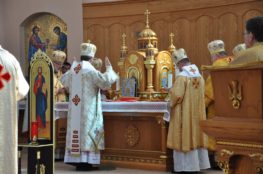A priest—an Eastern Orthodox priest—once told me that the devil rides us extra hard during Lent. It is an observation I have repeated many times, probably because it is the most accurate thing any cleric has ever told me. All of my Orthodox Lents save one were difficult personally and professionally. That was enough to ensure I reaped very little spiritually during the 40 Days plus Holy Week. Then came Holy Saturday, the Book of Jonah, a long nap on the couch, and, finally, the Paschal Homily of St. John Chrysostom. If my spirit didn’t lighten at that moment, it did shortly thereafter amid cries of Christ is risen! (English, Greek, Slavonic, etc.) and the chanting of “The Angel Cried.” Each year I would think to myself how wonderful it would be if, by next Lent, I might be that man from the homily who labored from the ninth or sixth hours rather than the eleventh. It never quite happened that way. I may have started out at the first hour, but it was inevitable that I’d go AWOL for a time before the gate was shut. And then one Lent, some four years ago, I went missing and never came back. The gate—the eastern gate that looks particularly wide and inviting compared to all the other eastern gates—was shut, never to be opened to me again.
Had I chosen to abandon the labor altogether, this would be a much different entry on a much different blog. But as more than a few people know, I found a different gate through which to enter into the joy of the Lord. I had circled about it for many years, testing the handle every now and again to ensure it wasn’t locked before quickly dashing off lest anyone notice me. It was, in retrospect, a terrible way to try and live out the Christian faith, constantly wondering where I should be at any given moment. Maybe that is why Lent 2011 was especially hard, for I could no long accept fully the place I called home for seven years any more than I could sit comfortably in a pew without worrying if I was consummating a great betrayal of everything I once professed to believe. If that sounds overly dramatic, that’s because it is—and thankfully I realized as much before losing myself to the sort of endless fretting that can, without warning, give way to despair.
To think of parting Orthodoxy for Catholicism as a “great betrayal” is to buy into a certain triumphalistic narrative which, unfortunately, is played up to a ghastly degree during the first two Sundays of the Great Byzantine Fast. For too many, the Sunday of the Triumph of Orthodoxy becomes little more than a triumph for Orthodoxy over and against the Catholics with their disordered attachment to bleeding statues and chubby Renaissance cherubs. Then comes the Sunday of St. Gregory Palamas, a second ostensible triumph for Orthodoxy against the “errors of the Latins.” Never mind, of course, the degree to which Palamas leaned on Latin Fathers, particularly St. Augustine, or the fact that the good bishop of Thessalonica never set out to be the Greek version of St. Thomas Aquinas. That was a role he was saddled with centuries after his repose by the likes of Lossky and Romanides. East/West relations, to say nothing of their sympathetic mutual theological understanding, have not been better off for it. If you don’t believe me, pick up a copy of David Bradshaw’s Aristotle East and West and weep.
Not that there is anything wrong with the Byzantine Rite’s liturgical schema for Lent, or so I opined a few days ago. Placed in soberer hands, the Sundays of the Triumph of Orthodoxy and St. Gregory Palamas are beautiful commemorations of the East’s rich spiritual-theological patrimony. It is the genius of the Catholic mind to take a broad view of the legitimate diversity which should flourish in the Church even if historical practice has not quite lived up to that ideal. Indeed, there are still Catholics who are suspicious of this ideal, fearing—irrationally—that anything which is not distinctly “Roman” is presumptively defective. These heirs of a cloudier period in ecclesiastical history have plenty of counterparts in Eastern Orthodoxy, the sort which take “Byzantine” in its worse sense as the final measuring stick of goodness and truth. May they drive each other mad with absurd accusations and uncharitable caricatures, and leave the rest of us be.



